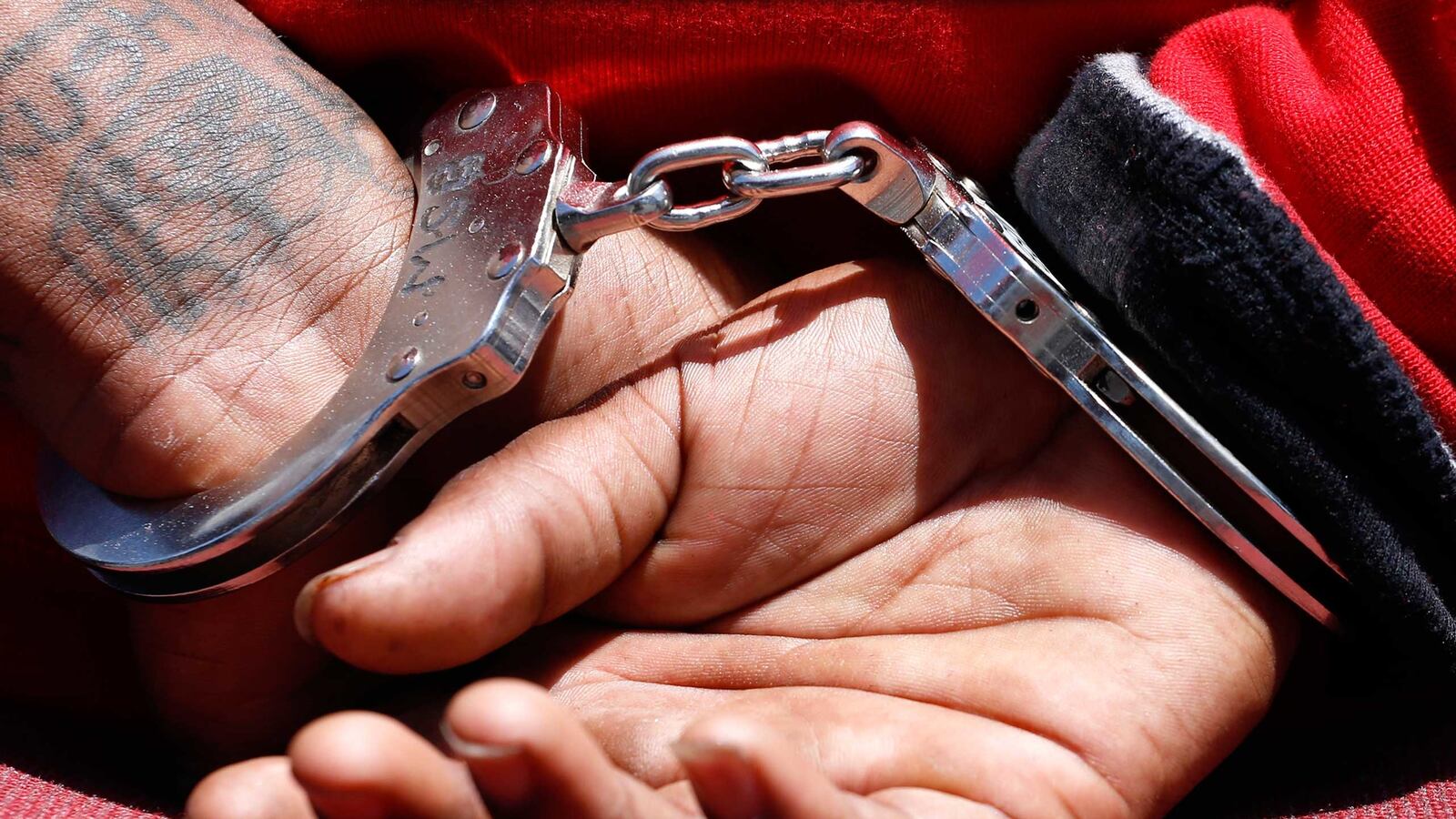If only Eric Garner wasn’t resisting arrest, he would be alive. NYPD defenders told me that as I covered the months of rage following the July death of the Staten Island man, as police tried to arrest him for peddling loose cigarettes last July.
“There’s a law to uphold—you're told put your hands behind your back, you do so,” one retired detective told me from the pro-NYPD side of dueling protests last December. Across the barricades that frigid night, demonstrators chanted that the New York’s police are racists and terrorists.
The rancor that convulsed the city has since subsided, at least above the surface. There aren’t daily protests. The police are steadily being retrained in how to interact with New Yorkers. The leader of a police union even recently exchanged compliments with Mayor de Blasio. (He had earlier called a “total nincompoop.”)
But resisting arrest and Garner’s death are quietly returning to the debate, risking the reopening of wounds that probably never fully healed. Two New York state lawmakers are seeking to stiffen penalties for resisting arrest. A misdemeanor now, resisting arrest would become a felony if the perpetrator was previously convicted of resisting arrest two or more times in the last 10 years. The offense now can get you a year in prison. That would be upped to four.
“I was actually quite shocked that resisting arrest is only a misdemeanor,” one of the sponsors, State Senator Tony Avella, a Democrat from Queens, told me.
“General advice: the police officers are there to protect the public. When you resist arrest sometimes you hurt yourself and the officer as well.”
Avella says the idea isn’t to crack down on protesters engaged in civil disobedience. But that’s exactly how many protest groups in New York have interpreted the move. And there’s no special treatment in the bill for those arrested, say, demonstrating against horse carriages versus a suspected drug dealer fleeing a cop—although Avella stresses wide discretion would be given to local district attorneys.
Avella also says the idea came not from conversations with the City’s police department, but rather from talking with a local police union and thinking about the recent deaths attributed to police, in Staten Island and elsewhere. New York Police Commissioner Bill Bratton speaks favorably of the bill, arguing it does not deter the city’s nearly 2,000 resisting arrest charges each year.
“I think a felony would be very helpful in terms of raising the bar significantly in the penalty for the resistance of arrest,” Bratton told reporters after a State Senate hearing in February, according to the New York Observer. “We need to get around this idea that you can resist arrest. You can’t. You just can’t do it. It results in potential injuries to the officer, to the suspect. And we need to change that, and the way to change that is to start penalties for it.”

Mayor de Blasio, who was elected on a platform that emphasized police reform and met with activist groups during the Garner protests,is also open to the idea. “On the core question of how citizens should handle their relationship with police—it's abundantly clear, if a police officer says you're under arrest, you must—you must—submit to that,” the mayor said in January.
But some criminal justice experts differ about the bill’s merits.
“Terrible idea,” said Samuel Walker, an oft-quoted police accountability specialist and professor emeritus of criminal justice at the University of Nebraska at Omaha. “It’s a mistake. It’s going in the wrong direction.”
Walker says his research indicates resisting arrest—rather than coming as a result of hostile perpetrators—often stems from a few officers in each department raring for a fight, who are unable or unwilling to defuse the hostility that naturally stems from when one is ordered to put his hands behind his back.
He suggests departments create “Early Intervention Systems,” which track officer performance, including how many arrests they make for resisting arrest—something that apparently the NYPD does in some form. (This is not to be confused with its Early Intervention Unit, which is instead for counseling cops feeling overwhelmed on the job).
Officers found to be excessive in bringing resisting arrest charges could then be disciplined, retrained, or both.
“Resisting arrest charges have been misused. It’s better to put the emphasis on de-escalation, which has been endorsed by just about everyone these days, including the President’s Task force,” Walker said, referring to President Obama’s Task Force on 21st Century Policing, where Walker was a witness.
Officers will also charge someone with resisting arrest after they wield more force than may have been necessary, according to one expert on police violence.
“Whether there was a crime or not, it’s a way to justify the use of force,” says Geoffrey Alpert of the University of South Carolina. “Someone needs to investigate closely whether it was a legitimate charge.”
The notion that a few cops are responsible for most of the resisting arrest charges is often repeated, though the academics I talked with didn’t have the statistics to back up this assertion. Neither did the NYPD nor the state’s Division of Criminal Justice Services. (Alpert told me that research on resisting arrest is fairly limited).
Former cops say it wouldn’t be surprising if few cops are behind the bulk of arrests. But there may be reasons other than an officer’s hostility. Mark Frunzi, the former detective I met at the dueling protest in December, conceded that “there’s definitely some loose cannons around.” But he says some officers are simply more assertive than others—willing to cross the street to confront a perpetrator—which may increase the chances they will tangle with someone who is resisting arrest.
“Those are the guys who want to work, who want to make a difference,” Frunzi added, appreciatively.
What is clear is that the number of arrests for resisting arrest have dropped recently—a little more than 11,000 in 2014 from more than 13,000 in 2012, according to the police department.
What is also clear is that, at least in New York City, more than half of arrests for resisting arrest routinely end up dismissed in court. Fifty-two percent of more than 4,400 cases resolved last year were dropped. Just eight arrests ended in convictions.
By stiffening penalties, Bratton sees fewer people even heading to court. Instead, he thinks the prospect of more prison time would dissuade potential offenders from failing to follow a police officer’s orders on the street.
But another policing expert, and former NYPD lieutenant, isn’t convinced.
“Resisting arrest is really a spontaneous act,” said Darrin Porcher, a professor at Pace University, who nonetheless supports ramping up the penalty “to set a lesson.”
It’s a lesson gleaned from his own experience.
Porcher still carries a scar from someone who resisted his arrest for drug dealing on a crack-riddled stretch of the Bronx in the mid-1990s. (His big regret is that he didn’t call for backup.)
Porcher also backs boosting conflict resolution skills. “If everyone is fighting you that you’re taking into custody, you’re doing something wrong,” he says. After Garner’s death, the NYPD is slowly retraining its force after, even as crime levels are a fraction of what they were when Porcher patrolled.
In 1990, there were 2,245 murders. There were 328 last year.
So this doesn’t lead us back to the question of whether or not Eric Garner resisted arrest on Bay Street in Staten Island last July. It does, howver, call to question if police should have been directed to arrest Garner for peddling loose cigarettes in the first place. It is, of course, largely up to State and local lawmakers to determine whether that offense should be addressed with handcuffs, or if there are better remedies to increase the chances that people like Garner can instead acquire lawful, gainful employment.
Avella, the sponsor of the resisting arrest bill, said he hadn’t really thought about whether police should be directed to a different approach when confronting an infraction like the one Garner was allegedly committing that July day.
“I’ll take a look at that,” he said.






